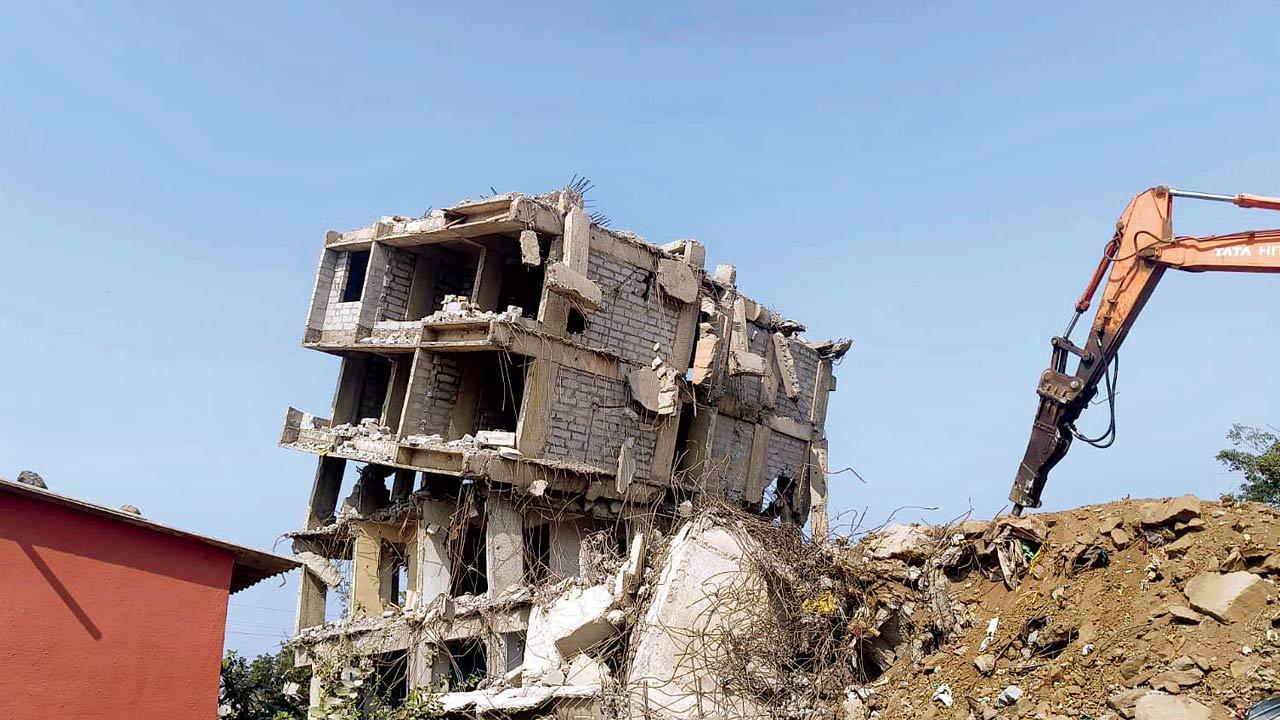The Maharashtra State Housing Federation and MahaSEWA have provided vital steps to ensure legality of property before securing home loans

KDMC contractors carrying out demolition of illegal buildings
The Maharashtra State Housing Federation and the Maharashtra Societies Welfare Association (MahaSEWA) have issued a checklist and a word of caution for homebuyers planning to use their life savings to secure home loans for purchasing resale flats or under-construction properties.
ADVERTISEMENT
The advisory comes in response to recent mid-day reports on the demolition of 65 illegal buildings by the Kalyan-Dombivli Municipal Corporation (KDMC) and 41 unauthorised structures by the Vasai-Virar City Municipal Corporation, following directives from the Bombay High Court.
Buyers beware
Speaking to mid-day, Advocate Shreeprasad Parab, expert director, Maharashtra State Housing Federation said, “The days are gone where the developers initially use to execute construction irrespective of the mandatory sanctions, which resulted in huge loss not only to the buyers of such illegal/unauthorised properties but also a large impact on our environment. The state federation is working on the solutions of sustainable development and integration of the day-to-day construction on the RERA portal providing the public at large, authorities and the buyers the day to day updates of construction vis a vis the approvals obtained.”
Many buyers still prefer resale flats over new ones due to their lower cost and the absence of GST, which saves 5 per cent of the flat's value. However, buyers must follow the principle of caveat emptor (buyer beware).
 CA Ramesh Prabhu, founder chairman, MahaSEWA; (right) Advocate Shreeprasad Parab, constitutional expert
CA Ramesh Prabhu, founder chairman, MahaSEWA; (right) Advocate Shreeprasad Parab, constitutional expert
Right to housing
CA Ramesh Prabhu, founder chairman, MahaSEWA said, “Right to housing is a fundamental right under the Constitution, and the State government is responsible for providing affordable homes to the masses, which unfortunately, is yet to see the light of the day.”
Buildings without OC
Prabhu added, “In Maharashtra, around three lakh buildings lack an occupation certificate (OC). The newly formed government should consider introducing an Amnesty Scheme to regularise these projects with a nominal penalty. Penalising flat buyers, who are not at fault, is unfair. Many invest heavily or take large loans to purchase their dream homes, only to face the shock of being told their building is illegal and might be demolished.
65
No. of illegal buildings demolished by KDMC
Checklist before buying a resale flat
1. Verify that the seller has clear title to the flat, acquired through registered sale, gift, succession, or will (check if probate is needed).
2. Ensure the flat is owned by one or more people; if jointly owned, both must sign the deed.
3. Confirm that the seller holds full membership rights, as associate or provisional members cannot sell.
4. Even if an NOC isn’t mandatory, request one to check for outstanding maintenance or other issues.
5. Verify whether the building has a conveyance deed and whether the society has an Occupation Certificate or at least a Completion Certificate (CC) for the
flat.
6. Check who holds possession of the flat (e.g., bank, lease) and ensure all taxes and bills are paid. Also, verify the redevelopment status of the society.
7. Ensure the flat matches approved plans and check for any alterations, as well as the need for repairs. A registered sale deed should be executed upon full payment.
8. If applicable, confirm that NOCs from authorities like CIDCO, MHADA, or SRA are obtained.
Source – State Housing Federation Expert Director
Checklist before buying a property
1. Verify the land’s title and project legality through a legal expert.
2. Use digital platforms in Mumbai, MMR, and Pune to check approved plans by planning authorities.
3. Search the IGR Maharashtra portal to ensure the property isn’t already mortgaged or registered to someone else.
4. Visit the MahaRERA website to check project details, pending litigations, and the developer’s track record.
5. Physically inspect the site at various times to assess accessibility, nearby amenities, and the flat’s location and view.
6. Remember, a loan sanction doesn’t guarantee legal compliance. Ensure thorough due diligence to avoid future liabilities.
(Source: CA Ramesh Prabhu)
 Subscribe today by clicking the link and stay updated with the latest news!" Click here!
Subscribe today by clicking the link and stay updated with the latest news!" Click here!







